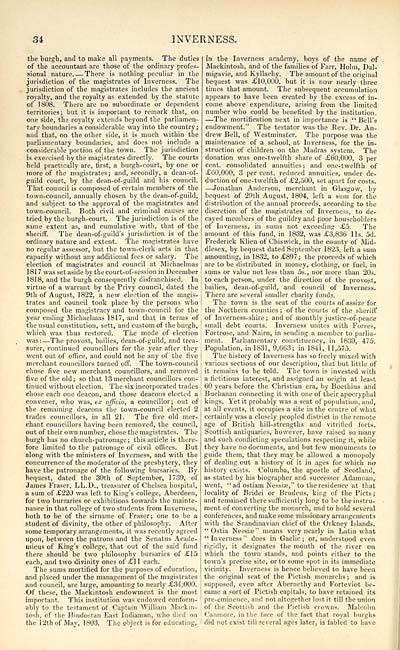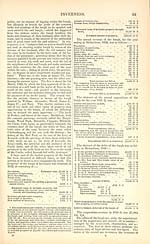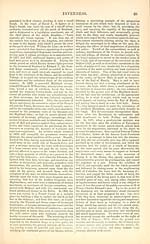Topographical, statistical, and historical gazetteer of Scotland > Volume 2
(44) Page 34 - INV
Download files
Complete book:
Individual page:
Thumbnail gallery: Grid view | List view

34
INVERNESS.
the burgh, and to make all payments. The duties
of the accountant are those of the ordinary profes-
sional nature There is nothing peculiar in the
jurisdiction of the magistrates of Inverness. The
jurisdiction of the magistrates includes the ancient
royalty, and the royalty as extended by the statute
of 1808. There are no subordinate or dependent
territories; but it is important to remark that, on
one side, the royalty extends beyond the parliamen-
tary boundaries a considerable way into the country;
and that, on the other side, it is much within the
parliamentary boundaries, and does not include a
considerable portion of the town. The jurisdiction
is exercised by the magistrates directly. The courts
held practically are, first, a burgh-court, by one or
more of the magistrates; and, secondly, a dean-of-
guild court, by the dean-of-guild and his council.
That council is composed of certain members of the
town-council, annually chosen by the dean-of-guild,
and subject to the approval of the magistrates and
town-council. Both civil and criminal causes are
tried by the burgh-court. The jurisdiction is of the
same extent as, and cumulative with, that of the
sheriff. The dean-of-guild's jurisdiction is of the
ordinary nature and extent. The magistrates have
no regular assessor, but the town-clerk acts in that
capacity without any additional fees or salary. The
election of magistrates and council at Michaelmas
1817 was set aside by the court-of-session in December
1818, and the burgh consequently disfranchised. In
virtue of a warrant by the Privy council, dated the j
9th of August, 1822, a new election of the magis- i
trates and council took place by the persons who |
composed the magistracy and town-council for the
year ending Michaelmas 1817, and that in terms of!
the usual constitution, sett, and custom of the burgh,
which was thus restored. The mode of election
was: — The provost, bailies, dean-of-guild, and trea- ,
surer, continued councillors for the year after they :
went out of office, and could not be any of the five |
merchant councillors turned off. The town-council
chose five new merchant councillors, and removed
five of the old; so that 13 merchant councillors con-
tinued without election. The six incorporated trades
chose each one deacon, and those deacons elected a
convener, who was, ex officio, a councillor; out of
the remaining deacons the town-council elected 2
trades councillors, in all 21. The five old mer-
chant councillors having been removed, the council,
out of their own number, chose the magistrates. The
burgh has no church-patronage; this article is there-
fore limited to the patronage of civil offices. But
along with the ministers of Inverness, and with the
concurrence of the moderator of the presbytery, they
have the patronage of the following bursaries. By
bequest, dated the 30th of September, 1739, of
James Fraser, LL.D., treasurer of Chelsea hospital,
a sum of £220 was left to King's college, Aberdeen,
for two bursaries or exhibitions towards the mainte-
nance in that college of two students from Inverness,
both to be of the sirname of Fraser; one to be a
student of divinity, the other of philosophy. After
some temporary arrangements, it was recently agreed
upon, between the patrons and the Senatus Acade-
micus of King's college, that out of the said fund
there should be two philosophy bursaries of £15
each, and two divinity ones of £11 each.
The sums mortified for the purposes of education,
and placed under the management of the magistrates
and council, are large, amounting to nearly £34,000.
Of these, the Mackintosh endowment is the most
important. This institution was endowed conform-
ably to the testament of Captain William Mackin-
tosh, of the Hindostan East Indiaman, who died on
the 12th of May, 1803. The object is for educating,
in the Inverness academy, boys of the name c-f
Mackintosh, and of the families of Farr. Holm, Dal-
migavie, and Kyllachy. The amount of the original
bequest was £10,000, but it is now nearly three
times that amount. The subsequent accumulation
appears to have been created by the excess of in-
come above expenditure, arising from the limited
number who could be benefited by the institution,
— The mortification next in importance is " Bell's
endowment." The testator was the Rev. Dr. An-
drew Bell, of Westminster. The purpose was the
maintenance of a school, at Inverness, for the in-
struction of children on the Madras system. The
donation was one-twelfth share of £60,000, 3 per
cent, consolidated annuities; and one-twelfth of
£60,000, 3 per cent, reduced annuities, under de-
duction of one-twelfth of £2,500, set apart for costs.
— Jonathan Anderson, merchant in Glasgow, by
bequest of 29th August, 1804, left a sum for the
distribution of the annual proceeds, according to the
discretion of the magistrates of Inverness, to de-
cayed members of the guildry and poor householders
of Inverness, in sums not exceeding £5. The
amount of this fund, in 1832, was £3,836 lis. 5d.
Frederick Klien of Chiswick, in the county of Mid-
dlesex, by bequest dated September 1823, left a sum
amounting, in 1832, to £897 ; the proceeds of which
are to be distributed in money, clothing, or fuel, in
sums or value not less than 5s., nor more than 20s.
to each person, under the direction of the provost,
bailies, dean-of-guild, and council of Inverness.
There are several smaller charity funds.
The town is the seat of the courts of assize for
the Northern counties ; of the courts of the sheriff,
of Inverness-shire; and of monthly justice-of-peace
small debt courts. Inverness unites with Forres,
Fortrose, and Nairn, in sending a member to parlia-
ment. Parliamentary constituency, in 1839, 475.
Population, inl831, 9,663; in 1841, 11,575.
The history of Inverness has so freely mixed with
various sections of our description, that but little of
it remains to be told. The town is invested with
a fictitious interest, and assigned an origin at least
60 years before the Christian era, by Boethius and
Buchanan connecting it with one of their apocryphal
kings. Yet it probably was a seat of population, and,
at all events, it occupies a site in the centre of what
certainly was a closely peopled district in the remote
age of British hill-strengths and vitrified forts.
Scottish antiquaries, however, have raised so many
and such conflicting speculations respecting it, while
they have no documents, and but few monuments to
guide them, that they may be allowed a monopoly
of dealing out a history of it in ages for which no
history exists. Columba, the apostle of Scotland,
as stated by his biographer and successor Adamnan,
went, "ad ostiam Nessice," to theresidence at that
locality of Bridei or Brudeus, king of the Picts ;
and remained there sufficiently long to be the instru-
ment of converting the monarch, and to hold several
conferences, and make some missionary arrangements
with the Scandinavian chief of the Orkney Islands.
" Ostia Nessire" means very nearly in Latin what
"Inverness" does in Gaelic; or, understood even
rigidly, it designates the mouth of the river on
which the town stands, and points either to the
town's precise site, or to some spot in its immediate
vicinity. Inverness is hence believed to have been
the original seat of the Pictish monarchs ; and is
supposed, even after Abernethy and Forteviot be-
came a sort of Pictish capitals, to have retained its
pre-eminence, and not altogether lost it till the union
of the Scottish and the Pictish crowns. Malcolm
Canmore, in the face of the fact that royal burghs
did tiot exist till several ages later, is fabled to have
INVERNESS.
the burgh, and to make all payments. The duties
of the accountant are those of the ordinary profes-
sional nature There is nothing peculiar in the
jurisdiction of the magistrates of Inverness. The
jurisdiction of the magistrates includes the ancient
royalty, and the royalty as extended by the statute
of 1808. There are no subordinate or dependent
territories; but it is important to remark that, on
one side, the royalty extends beyond the parliamen-
tary boundaries a considerable way into the country;
and that, on the other side, it is much within the
parliamentary boundaries, and does not include a
considerable portion of the town. The jurisdiction
is exercised by the magistrates directly. The courts
held practically are, first, a burgh-court, by one or
more of the magistrates; and, secondly, a dean-of-
guild court, by the dean-of-guild and his council.
That council is composed of certain members of the
town-council, annually chosen by the dean-of-guild,
and subject to the approval of the magistrates and
town-council. Both civil and criminal causes are
tried by the burgh-court. The jurisdiction is of the
same extent as, and cumulative with, that of the
sheriff. The dean-of-guild's jurisdiction is of the
ordinary nature and extent. The magistrates have
no regular assessor, but the town-clerk acts in that
capacity without any additional fees or salary. The
election of magistrates and council at Michaelmas
1817 was set aside by the court-of-session in December
1818, and the burgh consequently disfranchised. In
virtue of a warrant by the Privy council, dated the j
9th of August, 1822, a new election of the magis- i
trates and council took place by the persons who |
composed the magistracy and town-council for the
year ending Michaelmas 1817, and that in terms of!
the usual constitution, sett, and custom of the burgh,
which was thus restored. The mode of election
was: — The provost, bailies, dean-of-guild, and trea- ,
surer, continued councillors for the year after they :
went out of office, and could not be any of the five |
merchant councillors turned off. The town-council
chose five new merchant councillors, and removed
five of the old; so that 13 merchant councillors con-
tinued without election. The six incorporated trades
chose each one deacon, and those deacons elected a
convener, who was, ex officio, a councillor; out of
the remaining deacons the town-council elected 2
trades councillors, in all 21. The five old mer-
chant councillors having been removed, the council,
out of their own number, chose the magistrates. The
burgh has no church-patronage; this article is there-
fore limited to the patronage of civil offices. But
along with the ministers of Inverness, and with the
concurrence of the moderator of the presbytery, they
have the patronage of the following bursaries. By
bequest, dated the 30th of September, 1739, of
James Fraser, LL.D., treasurer of Chelsea hospital,
a sum of £220 was left to King's college, Aberdeen,
for two bursaries or exhibitions towards the mainte-
nance in that college of two students from Inverness,
both to be of the sirname of Fraser; one to be a
student of divinity, the other of philosophy. After
some temporary arrangements, it was recently agreed
upon, between the patrons and the Senatus Acade-
micus of King's college, that out of the said fund
there should be two philosophy bursaries of £15
each, and two divinity ones of £11 each.
The sums mortified for the purposes of education,
and placed under the management of the magistrates
and council, are large, amounting to nearly £34,000.
Of these, the Mackintosh endowment is the most
important. This institution was endowed conform-
ably to the testament of Captain William Mackin-
tosh, of the Hindostan East Indiaman, who died on
the 12th of May, 1803. The object is for educating,
in the Inverness academy, boys of the name c-f
Mackintosh, and of the families of Farr. Holm, Dal-
migavie, and Kyllachy. The amount of the original
bequest was £10,000, but it is now nearly three
times that amount. The subsequent accumulation
appears to have been created by the excess of in-
come above expenditure, arising from the limited
number who could be benefited by the institution,
— The mortification next in importance is " Bell's
endowment." The testator was the Rev. Dr. An-
drew Bell, of Westminster. The purpose was the
maintenance of a school, at Inverness, for the in-
struction of children on the Madras system. The
donation was one-twelfth share of £60,000, 3 per
cent, consolidated annuities; and one-twelfth of
£60,000, 3 per cent, reduced annuities, under de-
duction of one-twelfth of £2,500, set apart for costs.
— Jonathan Anderson, merchant in Glasgow, by
bequest of 29th August, 1804, left a sum for the
distribution of the annual proceeds, according to the
discretion of the magistrates of Inverness, to de-
cayed members of the guildry and poor householders
of Inverness, in sums not exceeding £5. The
amount of this fund, in 1832, was £3,836 lis. 5d.
Frederick Klien of Chiswick, in the county of Mid-
dlesex, by bequest dated September 1823, left a sum
amounting, in 1832, to £897 ; the proceeds of which
are to be distributed in money, clothing, or fuel, in
sums or value not less than 5s., nor more than 20s.
to each person, under the direction of the provost,
bailies, dean-of-guild, and council of Inverness.
There are several smaller charity funds.
The town is the seat of the courts of assize for
the Northern counties ; of the courts of the sheriff,
of Inverness-shire; and of monthly justice-of-peace
small debt courts. Inverness unites with Forres,
Fortrose, and Nairn, in sending a member to parlia-
ment. Parliamentary constituency, in 1839, 475.
Population, inl831, 9,663; in 1841, 11,575.
The history of Inverness has so freely mixed with
various sections of our description, that but little of
it remains to be told. The town is invested with
a fictitious interest, and assigned an origin at least
60 years before the Christian era, by Boethius and
Buchanan connecting it with one of their apocryphal
kings. Yet it probably was a seat of population, and,
at all events, it occupies a site in the centre of what
certainly was a closely peopled district in the remote
age of British hill-strengths and vitrified forts.
Scottish antiquaries, however, have raised so many
and such conflicting speculations respecting it, while
they have no documents, and but few monuments to
guide them, that they may be allowed a monopoly
of dealing out a history of it in ages for which no
history exists. Columba, the apostle of Scotland,
as stated by his biographer and successor Adamnan,
went, "ad ostiam Nessice," to theresidence at that
locality of Bridei or Brudeus, king of the Picts ;
and remained there sufficiently long to be the instru-
ment of converting the monarch, and to hold several
conferences, and make some missionary arrangements
with the Scandinavian chief of the Orkney Islands.
" Ostia Nessire" means very nearly in Latin what
"Inverness" does in Gaelic; or, understood even
rigidly, it designates the mouth of the river on
which the town stands, and points either to the
town's precise site, or to some spot in its immediate
vicinity. Inverness is hence believed to have been
the original seat of the Pictish monarchs ; and is
supposed, even after Abernethy and Forteviot be-
came a sort of Pictish capitals, to have retained its
pre-eminence, and not altogether lost it till the union
of the Scottish and the Pictish crowns. Malcolm
Canmore, in the face of the fact that royal burghs
did tiot exist till several ages later, is fabled to have
Set display mode to: Large image | Transcription
Images and transcriptions on this page, including medium image downloads, may be used under the Creative Commons Attribution 4.0 International Licence unless otherwise stated. ![]()
| Gazetteers of Scotland, 1803-1901 > Topographical, statistical, and historical gazetteer of Scotland > Volume 2 > (44) Page 34 - INV |
|---|
| Permanent URL | https://digital.nls.uk/97449118 |
|---|
| Description | Volume second: I-Z. |
|---|---|
| Shelfmark | Map Room Ref.2 |
| Attribution and copyright: |
|

